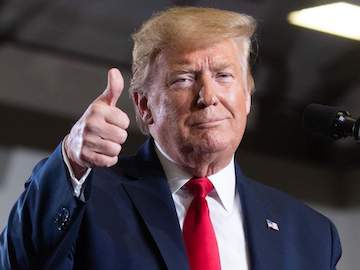President Donald Trump said he supports efforts in Congress to provide U.S. airlines with more aid to avert massive job losses, which could start Oct. 1 when restrictions expire from a prior round of federal assistance.
“I think it’s very important that we keep the airlines going,” Trump told reporters at a White House briefing. “We don’t want to lose our airlines, so if they’re looking at that, whether they’re Republican or Democrat, I’d be certainly in favor. We can’t lose our transportation system.”

Last week, a bipartisan group of 223 members of the House backed the extension in a letter to congressional leaders.
The senators, led by Cory Gardner of Colorado, said in the letter that they fear carriers will have to fire vast numbers of workers when restrictions tied to existing payroll assistance expire on Sept. 30.
A Standard & Poor’s index of the five biggest U.S. airlines jumped 4.5% after news of the senators’ effort on Wednesday—the biggest gain in three weeks, led by American Airlines Group Inc.
Recovery Stalling
Airlines in the past week operated with about 27% of the number of passengers they carried last year, according to Transportation Security Administration data. The numbers had been increasing in May and June, but stalled last month. Still to come: what’s historically been the slowest part of the year.
“Obviously the airline business is not doing very well. You have shut downs all over the world and you have airlines that are essentially shut down,” Trump said.
U.S. airlines have warned about 76,000 employees that they could face furlough on Oct. 1, according to estimates by a Cowen Inc. analyst. The number will be reduced by an unknown amount as a result of voluntary separation, early retirement and extended leave programs already offered by carriers. Southwest has said enough workers took its offers that it won’t lay off any at least through year-end.
Almost 150,000 workers at the four largest U.S. airlines already have agreed to leave the companies or take voluntary time off.
Industry Solidarity
The push to extend the payroll-support program began with a coalition of flight attendant unions and later grew to include labor groups across the industry. American Airlines CEO Doug Parker and United Airlines Holdings Inc. executives also have backed the legislation. Southwest Airlines Chief Executive Officer Gary Kelly said July 31 that he was “personally involved” in seeking help from “federal leaders.”
The Senate letter, previously reported on by Reuters, was signed by several prominent conservatives, such as Texas Republican John Cornyn, indicating it enjoys some bipartisan support. Mississippi Senator Roger Wicker, chairman of the committee overseeing aviation policy, also signed.
“We support a clean extension of payroll support for passenger air carrier employees included in the CARES Act to avoid furloughs and further support those workers,” the senators said in the letter, addressed to Majority Leader Mitch McConnell, a Kentucky Republican, and Minority Leader Chuck Schumer, a New York Democrat.
Durbin’s effort was described by a person who wasn’t authorized to speak about the details and asked not to be named. Durbin’s office didn’t immediately respond to a request for comment.
While the House and Senate letters lacked specifics, both seem to also endorse assistance to airline-industry contractors as well, which employ janitors, food service workers and others.
Even if support for airlines doesn’t make it into this round of stimulus—which is under tense negotiations between lawmakers and the White House—it could find itself attached to a September government funding bill. There’s been talk on Capitol Hill of combining the bill needed to prevent an Oct. 1 government shutdown with a transportation measure and additional virus relief if needed.











